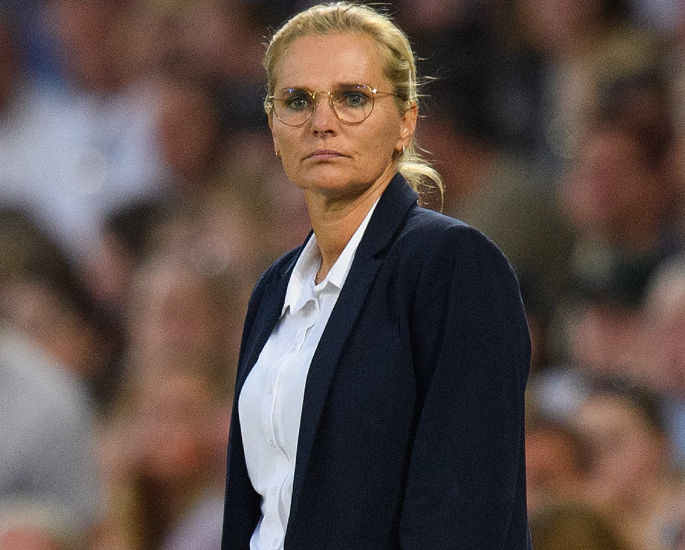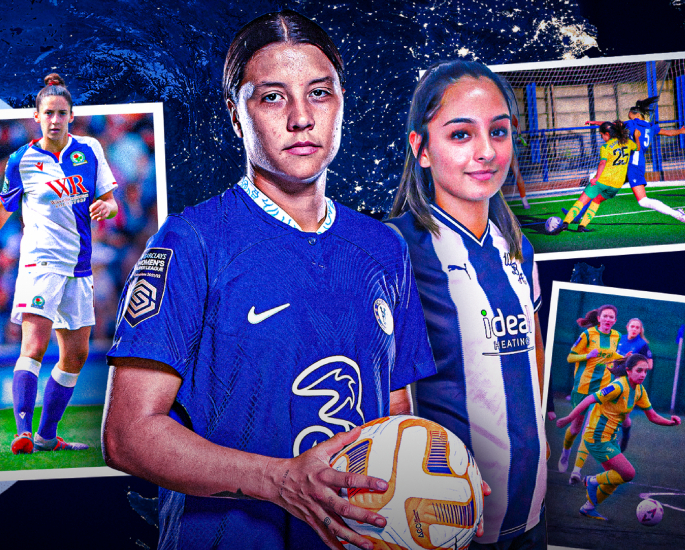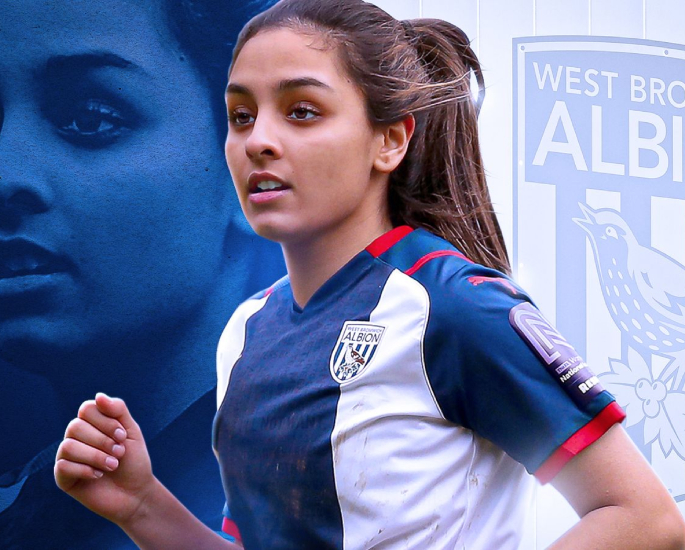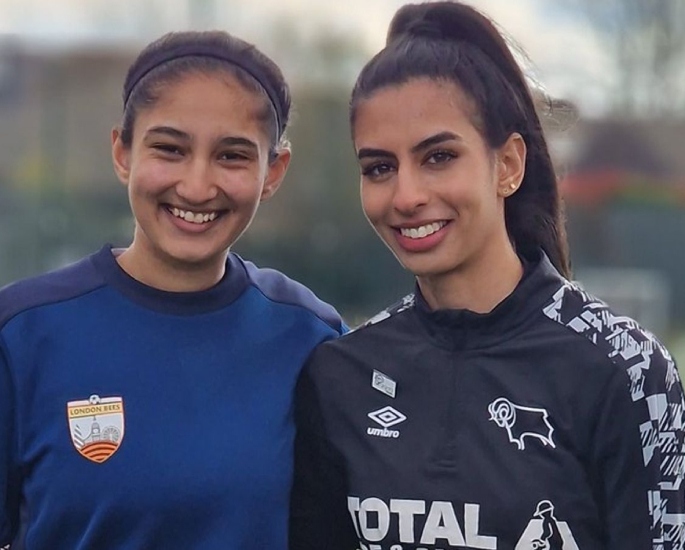No Diversity in England’s Lionesses Football Team
The England Lionesses are on the brink of history if they succeed in the 2023 Women’s World Cup Final on August 20, 2023.
The Lionesses lifted the European Championship in 2022 for the first time in a remarkable victory over eight-time champions, Germany.
Now, they face Spain in a crucial game to solidify their place as one of the greatest female sides of all time.
Whilst the success of the women’s English team is impressive, it’s raised massive questions about the diversity of the squad.
The same concerns were evident after their Euros triumph. But has anything changed since?
Although the number of black players is increasing, there are still no British Asian players getting a look in, despite playing for various English clubs.
Historically, the participation of British Asian women in football has been relatively limited due to a combination of cultural norms, social expectations, and the lack of representation.
However, as the sport gained traction within the community, British Asian women started to defy traditional gender roles and pursue their passion for football.
As per the PFA’s report from 2022, 9.7% of female footballers participating in the top-tier of football exhibit diverse ethnic origins.
Despite British Asians constituting the largest individual ethnic minority faction in the nation, a mere 0.6% of athletes in the Women’s Super League (WSL) belong to this community.
Even going into the 2023 World Cup, only two out of the 23 players forming the squad are of black ethnicity.
The ‘White’ Lionesses?


During the Women’s Euros tournament in 2022, England included three players of mixed-Black heritage in their squad.
However, the starting lineup for every match throughout their remarkable tournament victory consisted entirely of white players.
This occurrence reignited discussions regarding the deficiency of ethnic diversity in elite girls and women’s football.
Sarina Wiegman, the Dutch manager of the Lionesses expressed her opinion on the issue after the Euros, saying:
“We need to do more and we are doing more. The FA is doing more to give access to anyone who wants to play football.”
In 2022, during an interview with The Guardian, English striker Beth Mead discussed her book Lioness: My Journey to Glory, striker Beth Mead, becoming BBC Women’s Footballer of the Year, and her personal challenges.
However, when the topic shifted to the lack of diversity within the England women’s national football team, Mead downplayed concerns about racism, saying:
“I think it’s completely coincidental.
“We put out our best 11 [out during the Euros] and you don’t think of anyone’s race or anything like that.
“I think that’s more an outsider’s perspective.”
Mead did acknowledge that greater efforts should be made to ensure that football is inclusive and accessible to all individuals at the grassroots level.
However, she expressed her belief that racism is not a significant concern within the elite strata of women’s football.
During the remarkable journey of the Lionesses in the Euros, former England international Anita Asante raised concerns about the player pipeline in England.
She highlighted how it can impede numerous girls of colour from participating at the highest levels of the sport:
“Like England, France have reached the quarter-finals of Euro 2022, but unlike the Lionesses their 23-woman squad contains 15 black or brown players.
“Visibility – or the lack of it – remains the biggest problem.”
Current England captain Leah Williamson also has addressed the team’s lack of diversity head-on, telling BBC Sport in October 2022:
“Within the squad, this is an important issue and we’re all aware of it.
“There’s nothing that we can do right now to change it.”
Lotte Wubben-Moy, a teammate of Mead and Williamson on Arsenal and England, also discussed the issue with BBC Sport:
“I’m from London, I see a lot of deprivation.
“I see a lot of young children who don’t have opportunities.
“And while I feel like I have a responsibility to talk about it, I think everyone does.”
In July 2022, The Athletic reported that players of colour constitute less than 10% of the total 300 players participating in the WSL.
This is significantly lower than the approximate 33% representation seen in the men’s Premier League.
The Lionesses have also encountered accusations of racism within their program in previous instances.
In 2017, Eni Aluko, the director of recruitment at Angel City FC and a former player for England at that time, levelled allegations against then-manager Mark Sampson, citing instances of racist comments.
These instances encompassed a distasteful Ebola-related joke directed at Eni Aluko, who was born in Nigeria, and a question posed to forward Drew Spence about her arrest record.
Ultimately, the English FA formally apologised to Aluko for the distressing encounters she endured.
Prominent current and former players, including Eni Aluko, Lianne Sanderson, and Courtney Sweetman-Kirk, have shared their perspectives on the issue of ethnic diversity with Sky Sports News.
Chelsea manager Emma Hayes also recently voiced her opinion, asserting that women’s football, in her view, carries a predominantly “middle-class” identity.
Female Asian Footballers – Where Are They?


The FA is striving to reshape women’s football to be “a truer reflection of broader society,” ensuring increased representation of black and ethnic minority players within women’s football.
Concerns have previously been expressed about the concentration of top-tier girls’ academies in affluent suburban or rural areas.
The FA introduced a new structure in 2023, saying it will:
“See 95% of players accessing an Emerging Talent Centre (ETC) within one hour of where they live by 2024.”
The FA’s women’s technical director Kay Cossington said:
“We strive for our game to be more reflective of wider society and making our game more diverse, inclusive, and accessible is the central ambition to the restructure of our pathway.
“These changes ensure more focused investment and will address some of the historic challenges many different age groups have faced when trying to access the game.
“With more opportunities and a better geographic spread, we are incredibly confident that this will inspire a new generation of Lionesses to flourish and evolve our game for the future.”
In light of the accomplishments of both the men’s and women’s England teams, there has been a surge in the number of young South Asian female players.
Before the Women’s World Cup in 2019, there were no players of South Asian origin in the WSL.
But since then, a new generation of talents has risen.
Perhaps the most well-recognised player in women’s football is Sam Kerr.
The Australian international plays for Chelsea and almost knocked England out of the World Cup before they eventually went on to win 3-1.
Kerr has Indian roots, with her father being born in Kolkata, India.
Additionally, Simran Jhamat, an England youth international became Bristol City Women’s first British Asian professional player in July 2022.
Teenager Roop Kaur is a member of Queens Park Rangers Girls Under 16s, Rosie Kmita is affiliated with Watford, and Layla Banaras has joined Birmingham Under 16s.
Manisha Tailor MBE, recently promoted to assistant head of academy coaching at Queens Park Rangers, chimed in on the issue:
“Role models such as Simran and Rosie, as well as Lucindha Lawson, are at the heart of creating change towards seeing more elite South Asian female footballers.”
Amongst the other promising footballers is Mariam Mahmood who plays for West Bromwich Albion.
Alongside her is Millie Chandarana, a midfielder who currently plays for Blackburn Rovers.
Even though Kira Rai is still making a name for herself, the Derby County footballer has made immense strides in raising awareness for British Asian footballers.
One cannot forget Simran Jhamat of Coventry United. The 22-year-old is still entering her prime but remains a catalyst for female South Asian athletes.
So, it shows that there is a plethora of British Asians within grassroots football and playing at the elite level.
Yet, they’re not getting picked to play for the Lionesses on the grandest stage of them all.
Challenges Faced


Even though there are British Asians in the women’s ranks, they still face a number of hurdles to overcome – culturally and socially.
British Asian women footballers have encountered a range of challenges that have impeded their progress within the sport:
- Cultural and Family Pressures: Traditional cultural expectations and family pressures often prioritise academics or more culturally accepted activities over sports.
- Lack of Representation: The absence of role models and representation in professional football can make it difficult for young British Asian women to envision a future in the sport.
- Limited Opportunities: Access to quality coaching, facilities, and competitive leagues can be limited, making it harder for British Asian women to develop their skills and gain exposure.
- Social Stereotypes: Stereotypes regarding athleticism and the appropriateness of women playing sports can be discouraging.
What is being done to Improve Diversity?


In November 2022, Ella Toone, a forward for the England Women’s team, was part of an open letter addressed to the British government by the Lionesses subsequent to their victory in Euro 2022.
The letter advocated for equitable access to football for girls during physical education classes.
Toone considers this action as evidence of the squad’s resolute dedication to establishing a substantial and lasting impact on the realm of women’s football.
Talking to Sky Sports News, Toone said:
“A lot more can be done. We want to get as many people as we can involved in football and as many backgrounds as we can.”
But footballer Courtney Sweetman-Kirk has called for greater enthusiasm and energy to really focus on ethnic diversity in the women’s game, saying:
“In terms of South Asian, mixed race and Black girls looking up and thinking ‘I want to be like that’, they’ve not got many role models to look up to.
“There needs to be a desire for change and actually to open up a conversation.
“There needs to be change. We need to have these discussions.”
In recent times, the FA has initiated strategies aimed at engaging girls from inner-city locales and diverse backgrounds.
According to the ‘Discover My Talent’ initiative, the proportion of Black, Asian, and Minority Ethnic (BAME) girls participating at the under-17 level has surged from 5% to 36% over the past five years.
In March 2023, Sky Sports commemorated the anniversary of its collaboration with Sporting Equals.
They introduced an unprecedented timeline that chronicles the contemporary history of South Asian female players in English football.
In tribute to the evolution of women’s football during the WSL era, this timeline accentuates the accomplishments of 20 present and former players hailing from South Asian backgrounds.
These individuals have made significant strides in various leagues across Britain.
Among the athletes whose achievements are highlighted in this timeline are Manchester United goalkeeper Safia Middleton-Patel and former West Ham and Watford winger Rosie Kmita.
Curated by Sky Sports journalist and FA Level 2 scout Dev Trehan, the timeline is an integral component of a broader exhibition orchestrated by Sporting Equals.
This exhibition concurrently showcases four role models from the South Asian community in Britain who are actively engaged in the women’s football domain.
The spotlight in the exhibition is cast upon four players:
- Millie Chandarana (Blackburn Rovers)
- Simran Jhamat (Coventry United)
- Kira Rai (Derby County)
- Mariam Mahmood (West Bromwich Albion)
Sky Sports’ Dev Trehan said:
“Creating a timeline and highlighting these incredible female role models is a massive step forward for women’s football as well as South Asian communities.
“Documenting the journey of South Asian heritage female players in the modern English game has both historical significance and cultural importance, representing a genuine legacy for current and future generations.”
West Bromwich Albion forward Mariam Mahmood said:
“It’s an honour to feature in the timeline and to have my story showcased in this way.
“Education and bridging the gap in knowledge about South Asians in football remains a major issue.”
“Our stories matter and I hope this raises positive awareness and encourages more children – particularly girls from South Asian backgrounds – to take up the game and enjoy playing football.”
Blackburn Rovers midfielder Millie Chandarana expressed:
“This is a very important project, which documents progress and helps change the narrative.
“We can now see all the great things that these girls have achieved and continue to achieve, and it’s great to be a small part of it.
“I hope it gives inspiration to many more, to show that a career in football is possible for women from the South Asian community.”
Derby County winger Kira Rai revealed:
“To feature alongside some fabulous South Asian women as part of the history of the English women’s game is a matter of huge pride for me, my family, and my football club.
“We know women’s football is not as diverse as it should be, and I want to play my part to help change that.
“I hope this inspires the next generation and gives talented girls who look like me the belief that they can also make it in the game.”
Muslimah Sports Association (MSA) chair and FA National Game Board member Yashmin Harun highlighted:
“It’s very important to understand the history of South Asian female players in the game and reflect on their journeys for us to get to where we want to get to in terms of making elite women’s football more diverse.”
Since 2020, the FA actively engaged with players, parents, coaches, and clubs, while also factoring in new data.
The newly reimagined structure introduces the establishment of nearly 70 ETCs (Elite Talent Centres) dispersed throughout England, catering to aspiring young talents aged eight to 16.
As of July 2023, 56 ETCs have been inaugurated, and an additional 11 are in the pipeline, replacing the previously existing 28 Regional Talent Centres.
The overarching objective of the FA is to involve more than 4,200 young female players in talent programs across the nation by the culmination of the 23-24 season.
The comprehensive impact of the FA’s revamped talent pathway might take several years to fully manifest.
This is because players aged eight to 16 today may potentially be a decade away from reaching the Lionesses’ senior team or competing in the WSL.
However, discernible transformations should become evident at the youth level in the near future.
Substantial outcomes are anticipated from the FA’s newly devised pathway, particularly in terms of enhancing diversity within the talent pool.
British Asian women footballers are not just athletes; they are trailblazers, role models, and agents of change.
Their determination to pursue their passion for football in the face of cultural and societal challenges serves as an inspiration to all.
As the football landscape continues to evolve, they are being recognised.
But, the best course of action to promote inclusivity is to have them as part of the Lionesses squad, which has not been in the case to date.